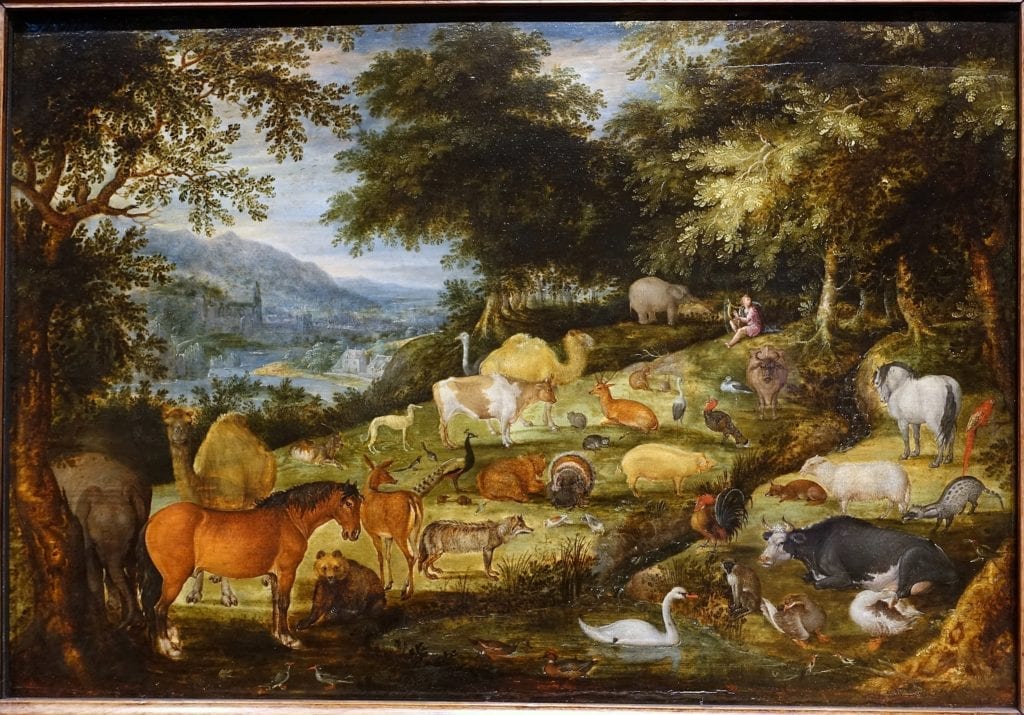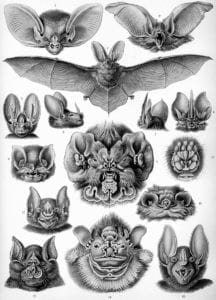Frank Gonzalez-Crussi
Chicago, Illinois, United States

Imagine, as painters have done, representatives of animal species congregated in an assembly (Fig. 1). A man comes to address this motley crowd in this way: “You guys [he purposefully adopts this condescending language] have recently wronged us. Let me start by reminding you that you did not discover fire; we did. You did not invent the wheel; we did. You did not develop laws, nor prohibited incest: all this we did. But, above all, we have the sovereign, incomparable gift of expressing our thoughts and feelings through the articulated word, which you lack. Now, words are the flesh of thought. Without words there can be no thoughts, and without thoughts there can be no reason. Hence we are infinitely superior to you. But you seem to forget all this and have harmed us.
“Admittedly, something like a graduated scale of reasoning powers exists among you. In the lowest rungs of the scale, animality reigns supreme; as you ascend, rationality grows stronger. Only at the top, where we stand, reason predominates uncontested. Some of you have climbed to a high level, but none has made it to where we are. This is impossible, because those who reach the top, a fortiori would cease to be what they were before and become human. But this would imply an ontological revolution: a change of “essence,” as philosophers might say. The gulf between us is unbridgeable. Still, this gives you no right to injure us, as you have recently done . . .”
The animals became so upset listening to this exordium that they miraculously broke forth in human utterance. Surprised? This has happened before. An ass carrying Balaam spoke (Numbers 22:28) and a serpent engaged in a most interesting conversation with Eve (Genesis 3:1-7). Many other examples exist inside and outside of Holy Scripture. Thus, a lion roared a response that started a debate.
─Lion (L): You, sir, are insolently biased and unfair! You think of us entirely as a function of your own (human) condition, while knowing nothing about our intimate nature, our fears, our hopes and aspirations. You define us, animals, by what we have not, are not, and cannot be or do (always, of course, by reference to the human standard). Thus, the animal is the non-human. What kind of definition is that? It is like saying that disease is the absence of health and death the absence of life: woefully uninformative, inane pseudo-definitions!
─Man (M): You interrupted me. I did not come here to discuss definitions. I began by saying that you have done us wrong. One of you has foisted upon us a terrible pandemic that is killing us by the thousands. The culprit must be held accountable. You must tell me who it was.
─L: What for? To punish him? We still remember that once you accused animals of crimes. You arrested, imprisoned, and subjected them to trials with robed judges, witnesses, prosecutors, defenders, and all. Innocent animals were condemned to death in lawyeresque-phrased decrees.1 We have not forgotten how a sow that mauled a boy was burned alive in a town near Paris in 1266, or how a bull that gored a peasant was tortured and hanged at Moisy-le-Temple’s public gibbet, before a cheering crowd.2
─M: I will admit that way back in the dark ages our laws treated brutes like men . . .
─L: Yes, like your laws today treat men like brutes.
─M: Say what you will, you have always followed us, causing us serious trouble. Sometimes unimaginable calamities, like bubonic plague.

A rat felt she was being alluded to and intervened:
─Rat: Let me point out that what you call filth and squalor are wonderful amenities to us. You lived amid muck and sewage for thousands of years, and we were only too happy to share your lodgings. Plague is one of our diseases, like diabetes and syphilis are yours. Prolonged co-habitation gave to the plague bacillus plenty of opportunities to adapt to life in a different host, and so it “leaped,” carried by fleas from us, rats, to you, humans. This was not easy, because men and rats are far apart in the zoological scale . . .
─M: You can say that again! We have nothing to do with each other.
A guffaw of laughter was heard coming from a chimpanzee, who said:
─Chimpanzee (Ch): How about us? What have you to say about chimpanzees, orangutans, or gorillas? We never co-habited with you; actually, we had very little intercourse with you (to our great fortune!), nevertheless we gave you AIDS,3 hepatitis B, Ebola, and many other wonderful gifts. Would you say that we have a lot to do with each other?
─M: As I said before, there is an unbridgeable gulf . . .
─Ch: I can’t believe it! Listen to this joker. He is ashamed of his ancestry! Charles Darwin joined man’s lineage─much to the scandal of boors like this one─to “a hairy, tailed quadruped probably arboreal in its habits.”4 Molecular biology has since irrefutably confirmed humankind’s kinship to animals. Still, should someone tell this man “You are an animal!” he would feel grievously insulted and choke in wrathful desires of revenge, whereas the most appropriate answer ought to be: “Yes, indeed, animal, and proud to be one!”
Unable to stand all this bantering, the man exclaimed:
─M: Enough! Don’t think that I have come here in complete ignorance. Our scientists have preliminary evidence that the origin of the pandemic is the bat. Confess, or we will conclude definitively that the bat is the viral reservoir and take appropriate action.
All eyes turned in the direction of the bat, who was hanging from a tree branch, head down, as is his custom. But he was in “torpor,” lethargic, and remained silent. Instead, an owl raised his cry to say:
─Owl (O): We owls sometimes eat bats. Therefore I know something about this amazing fellow, the only mammal capable of sustained flight. And what flight! In complete darkness he turns so rapidly and so suddenly that I simply cannot catch him. I have to wait until he goes into “torpor,” a state in which his metabolism is lowered and his body temperature goes down sometimes to 6º C. Men can then “unhook” a bat manually from his perch with a little cry and barely a wing tremor for all protest on his part.5 Or else I can trap those who are sick, or old. Weak newborns also fall to the ground sometimes, but those I usually don’t get, because─
A serpent interjected:
─Serpent: Because we, serpents, eat them! Dead bats we consider a delicacy. Newborn pups are a gourmet’s delight. We gulp them down whole, with untold pleasure.
─O: But, with all due respect, you serpents are not immortal. You die, too. And what happens to your mortal remains? The ants eat them!
─M: I see . . . Our scientists had thought snakes were an unlikely viral reservoir, but I don’t think they have studied ants from this standpoint. . . .
─O: Wait, wait! This is not the whole story. The ants have consumed the snake’s remnants. What happens then? Enter the pangolin: a singular, toothless ant eater, the only mammal all covered in squames. You don’t see a pangolin here today. He is in hiding, all rolled up into a ball as is his wont. He is in danger of extinction and is the object of an outrageous, illicit, international commerce. Why, even in Mexico customs officers have found pangolins tucked away in hand baggage! You see, pangolins command an incredibly high price in China, where they are used in preparations of traditional Chinese medicine. Yet they harbor coronaviruses.6
─M: I am confused. At the origin of the coronavirus pandemic I find bats, snakes, ants, pangolins, and crooked animal traffickers . . .
─O: Nor is this all, my human friend. Bats and pangolins excrete the coronavirus. Their urine bathes some fruits that are relished by another creature, the civet-cat. This one is also an endangered species and perhaps an important virus reservoir. I don’t see one here now.
─M: I now understand why Dr. Didier Sicard, an old gentleman researcher, says that the origin of the pandemic is a complex puzzle, of which the bat is only one piece.7 To reconstruct the whole puzzle, he says, old-fashioned field investigation is necessary. Only this requires walking into bats’ caves with feet sunk to the ankles in guano and other foul dejections, while picking up all manner of dangerous creepy-crawly vermin. This is a far cry from what a young researcher dreams, who would rather see himself sitting on a lab bench in a famed institute, among gleaming equipment, and dressed like an astronaut.
─O: That is very true. And if I may add a final word of advice, know that bats are not to blame, although─with the exception of the Chinese, who think of them as a symbol of joy─you have often associated bats with death, darkness, and witchcraft. Perhaps you have done this because of their pointed ears, little eyes, fleshy nose, and other features (Fig. 2). But bats are not to blame. None of us animals are the root-cause of the pandemic. You are. With your tunnel-boring, deforestation, fracking, and countless other ways of depredating the ecology, you are bringing creatures heretofore unfamiliar into contact with you; and your criminal commerce of rare animals is diffusing exotic infections worldwide. Reflect on all this before you accuse us.
On these words by the owl, the assembly dispersed amid a general, morose silence.
References
- E.P. Evans: The Criminal Prosecution and Capital Punishment of Animals. London. William Heinemann, 1906.
- Carlo d’Addosio: Bestie Delinquenti. Naples, Luigi Pierro. 1892, p. 15.
- Mirela D’Arc et al. : “Origin of the HIV-1 group O epidemic in western lowland gorillas.” Proceedings of the National Academy of Sciences (March 17, 2015) 112 (no. 11): E1343- E1352.
- Charles Darwin: The Descent of Man. Vol. 2, chapter XXI. London, John Murray, 1871,
- Norbert Casteret: “La Chauve-Souris” Croix-Rouge française de la jeunesse (1939) 14 ; No. 126: 106-108
- David Cyranoski: “Did pangolins spread the China coronavirus to people?” Nature (February 7, 2020): : doi: 10.1038/d41586-020-00364-2
- Tara Schlegel: “Didier Sicard: ‘Il est urgent d’enquêter sur l’origine animale de l’épidémie de Covid-19’ » France Culture. March 27, 2020.
FRANK GONZALEZ-CRUSSI, MD, is Emeritus Professor of Pathology of Northwestern University and a frequent contributor to Hektoen International. Further information on his work is available on Wikipedia.
Highlighted in Frontispiece Volume 12, Issue 3 – Summer 2020

Leave a Reply